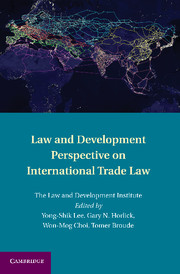Book contents
- Frontmatter
- Contents
- About the Editors and Authors
- Acknowledgments
- Law and development perspective on international trade law
- Introduction
- Part I Developing Countries and International Trade
- Part II Law and Development in the World Trade Organization
- 5 World Trade Organization and Developing Countries
- 6 Rediscovering the Role of Developing Countries in the GATT
- 7 WTO Dispute Settlement from the Perspective of Developing Countries
- 8 Pacific Countries in the WTO
- Part III Law and Development in Free Trade Agreements
- Part IV Law and Development in Regional Initiatives
- Epilogue
- Index
- References
6 - Rediscovering the Role of Developing Countries in the GATT
from Part II - Law and Development in the World Trade Organization
Published online by Cambridge University Press: 05 August 2011
- Frontmatter
- Contents
- About the Editors and Authors
- Acknowledgments
- Law and development perspective on international trade law
- Introduction
- Part I Developing Countries and International Trade
- Part II Law and Development in the World Trade Organization
- 5 World Trade Organization and Developing Countries
- 6 Rediscovering the Role of Developing Countries in the GATT
- 7 WTO Dispute Settlement from the Perspective of Developing Countries
- 8 Pacific Countries in the WTO
- Part III Law and Development in Free Trade Agreements
- Part IV Law and Development in Regional Initiatives
- Epilogue
- Index
- References
Summary
Introduction
At the launch of the Doha Round, developing countries were skeptical that the round would address the issues of concern to developing countries. Their skepticism was based on their experience of the past eight rounds of the General Agreement on Tariffs and Trade (GATT) that failed to address adequately the interests and concerns of developing countries. The Doha Round has witnessed developing countries play an active role, through the formation of several developing-country coalitions, based on specific issues, for example, the G20, Non-Agricultural Market Access (NAMA) 11, G33, and regional groups, such as the African Caribbean and Pacific (ACP) and groups that represented developing countries at lower levels of development, for example, least developed countries (LDCs) and small and vulnerable economies (SVEs). These groups have tended to be relatively organized and articulate in expressing their interests and advancing their negotiating positions. Some of the major developing-country groups such as the G20, NAMA 11, and G33 are technically competent and have been able to match the capacity of the major developed countries in the Doha negotiations. The unfolding history of this process has been recorded elsewhere, and this chapter does not intend to address this issue here.
- Type
- Chapter
- Information
- Law and Development Perspective on International Trade Law , pp. 130 - 160Publisher: Cambridge University PressPrint publication year: 2011



